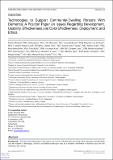| dc.contributor.author | Innes, Anthea | |
| dc.contributor.author | Meiland, Franka | |
| dc.contributor.author | Mountain, Gail | |
| dc.contributor.author | Robinson, Louise | |
| dc.contributor.author | van der Roest, Henriëtte | |
| dc.contributor.author | García-Casal, J. Antonio | |
| dc.contributor.author | Gove, Dianne | |
| dc.contributor.author | Thyrian, Jochen René | |
| dc.contributor.author | Evans, Shirley | |
| dc.contributor.author | Dröes, Rose-Marie | |
| dc.contributor.author | Kelly, Fiona | |
| dc.contributor.author | Kurz, Alexander | |
| dc.contributor.author | Casey, Dympna | |
| dc.contributor.author | Szcześniak, Dorota | |
| dc.contributor.author | Dening, Tom | |
| dc.contributor.author | Craven, Tom | |
| dc.contributor.author | Span, Marijke | |
| dc.contributor.author | Felzmann, Heike | |
| dc.contributor.author | Tsolaki, Magda | |
| dc.contributor.author | Franco-Martín, Manuel | |
| dc.date.accessioned | 2017-01-18T09:22:18Z | |
| dc.date.available | 2017-01-18T09:22:18Z | |
| dc.date.issued | 2017-01-16 | |
| dc.identifier.citation | Meiland F, Innes A, Mountain G, Robinson L, van der Roest H, García-Casal JA, Gove D, Thyrian JR, Evans S, Dröes RM, Kelly F, Kurz A, Casey D, Szcześniak D, Dening T, Craven MP, Span M, Felzmann H, Tsolaki M, Franco-Martin M Technologies to Support Community-Dwelling Persons With Dementia: A Position Paper on Issues Regarding Development, Usability, Effectiveness and Cost-Effectiveness, Deployment, and Ethics JMIR Rehabil Assist Technol 2017;4(1):e1 DOI: 10.2196/rehab.6376 | en_IE |
| dc.identifier.issn | 2369-2529 | |
| dc.identifier.uri | http://hdl.handle.net/10379/6256 | |
| dc.description.abstract | Background: With the expected increase in the numbers of persons with dementia, providing timely, adequate, and affordable care and support is challenging. Assistive and health technologies may be a valuable contribution in dementia care, but new challenges may emerge.
Objective: The aim of our study was to review the state of the art of technologies for persons with dementia regarding issues on development, usability, effectiveness and cost-effectiveness, deployment, and ethics in 3 fields of application of technologies: (1) support with managing everyday life, (2) support with participating in pleasurable and meaningful activities, and (3) support with dementia health and social care provision. The study also aimed to identify gaps in the evidence and challenges for future research.
Methods: Reviews of literature and expert opinions were used in our study. Literature searches were conducted on usability, effectiveness and cost-effectiveness, and ethics using PubMed, Embase, CINAHL, and PsycINFO databases with no time limit. Selection criteria in our selected technology fields were reviews in English for community-dwelling persons with dementia. Regarding deployment issues, searches were done in Health Technology Assessment databases.
Results: According to our results, persons with dementia want to be included in the development of technologies; there is little research on the usability of assistive technologies; various benefits are reported but are mainly based on low-quality studies; barriers to deployment of technologies in dementia care were identified, and ethical issues were raised by researchers but often not studied. Many challenges remain such as including the target group more often in development, performing more high-quality studies on usability and effectiveness and cost-effectiveness, creating and having access to high-quality datasets on existing technologies to enable adequate deployment of technologies in dementia care, and ensuring that ethical issues are considered an important topic for researchers to include in their evaluation of assistive technologies.
Conclusions: Based on these findings, various actions are recommended for development, usability, effectiveness and cost-effectiveness, deployment, and ethics of assistive and health technologies across Europe. These include avoiding replication of technology development that is unhelpful or ineffective and focusing on how technologies succeed in addressing individual needs of persons with dementia. Furthermore, it is suggested to include these recommendations in national and international calls for funding and assistive technology research programs. Finally, practitioners, policy makers, care insurers, and care providers should work together with technology enterprises and researchers to prepare strategies for the implementation of assistive technologies in different care settings. This may help future generations of persons with dementia to utilize available and affordable technologies and, ultimately, to benefit from them. | en_IE |
| dc.format | application/pdf | en_IE |
| dc.language.iso | en | en_IE |
| dc.publisher | JMIR Publications | en_IE |
| dc.relation.ispartof | JMIR Rehabilitation and Assistive Technologies | en |
| dc.rights | Attribution-NonCommercial-NoDerivs 3.0 Ireland | |
| dc.rights.uri | https://creativecommons.org/licenses/by-nc-nd/3.0/ie/ | |
| dc.subject | Dementia | en_IE |
| dc.subject | Technology | en_IE |
| dc.subject | Evaluation studies | en_IE |
| dc.subject | Innovation | en_IE |
| dc.subject | Diffusion of innovation | en_IE |
| dc.title | Technologies to support community-dwelling persons with dementia: a position paper on issues regarding development, usability, effectiveness and cost-effectiveness, deployment, and ethics | en_IE |
| dc.type | Article | en_IE |
| dc.date.updated | 2017-01-16T16:07:53Z | |
| dc.identifier.doi | 10.2196/rehab.6376 | |
| dc.local.publishedsource | http://dx.doi.org/10.2196/rehab.6376 | en_IE |
| dc.description.peer-reviewed | peer-reviewed | |
| dc.contributor.funder | |~| | |
| dc.internal.rssid | 11956604 | |
| dc.local.contact | Heike Schmidt-Felzmann, Dept. Of Philosophy & Cobra, Morrisroe House, 19 Distillery Road, Galway. 5043 Email: heike.felzmann@nuigalway.ie | |
| dc.local.copyrightchecked | No Open access fees were paid for this article. | |
| dc.local.version | PUBLISHED | |
| nui.item.downloads | 878 | |


